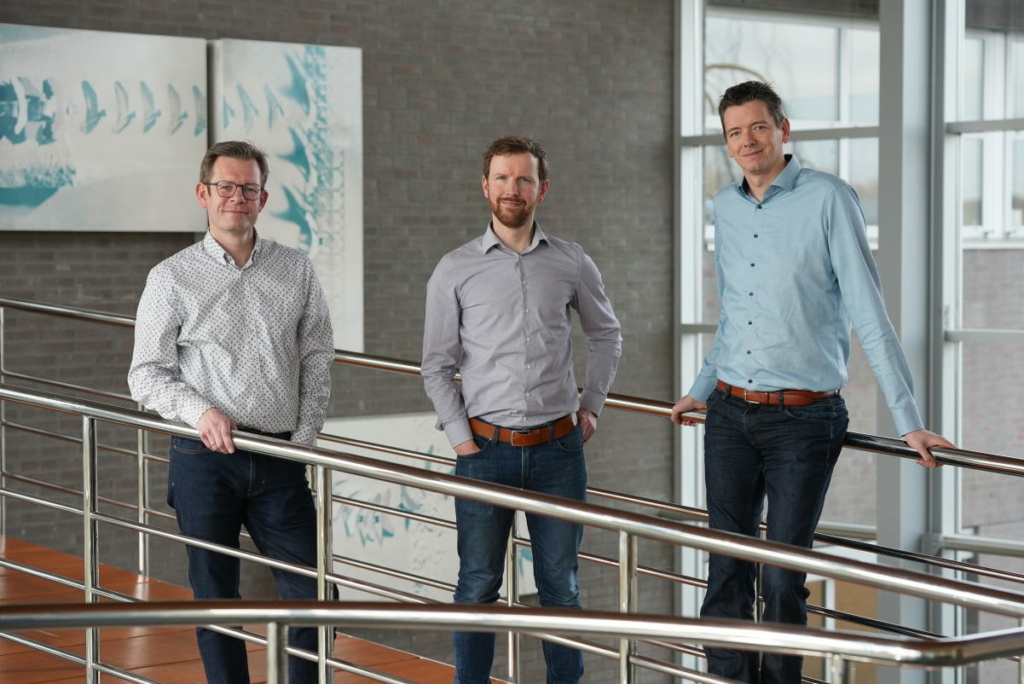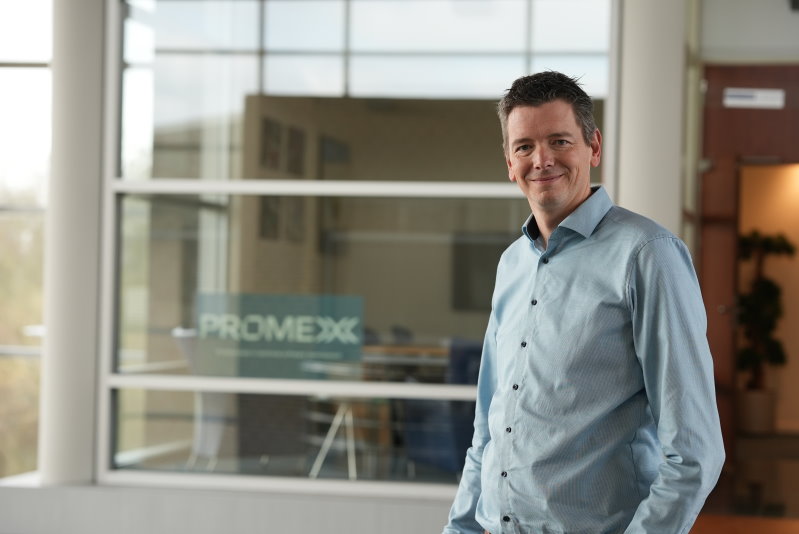
Growing with the customer without compromising on quality
Established in 2004 by Eric Schuerman and Maarten Beijloos, Promexx Technical Automation has been offering secondment services and fixed-price projects in technical software development for mechatronic systems. The Son-based company has managed to develop considerable expertise in diverse fields such as machine interfaces, databases, motion, robotics and vision. On its 20th anniversary, Promexx boasts a team of fifty employees and a client base of over twenty key players from the Dutch high-tech industry.
In September 2023, the company’s founders were bought out by the management team, comprising John van Meel, Kris Hoogendoorn and Oscar Reynhout, together with investment company Vondel Private Equity. “Our strategy and core values haven’t changed with this management buyout,” Hoogendoorn clarifies, “but we aim to introduce a new dynamism with a younger team.”
These core values, according to Van Meel, have always been threefold: “We have a passion for machinery, so we stay focused on technical software development for mechatronics. Secondly, we don’t compromise on quality. Our employees should take pride in themselves and their colleagues as we consistently deliver quality to our customers. Lastly, we value personal attention, both toward our customers and our employees. Whenever our customers face a problem, we take the time to assist them. In the same way, we dedicate our time to get to know our employees, what drives them and what they do in their personal lives.”

Similar journeys
Van Meel’s association with Maarten Beijloos dates back to his years working as a software designer at Turnkiek, which was later acquired by Imtech ICT. “Maarten was a sales manager at Imtech ICT then. He decided to participate in Promexx, recently founded by Eric Schuerman, and in 2006, I joined them. They even thought about offering me a management position, but this wasn’t possible with the company’s size at the time. So, I was posted at Assembléon, first as a software developer, then as a project leader, during which I introduced Scrum to the company. Eventually, I became responsible for the software of their new iFlex pick-and-place machine.” Owing to his experience in various roles and domains, Van Meel became account manager at Promexx in 2013.
Hoogendoorn started his career at Topic Embedded Systems, where he was posted as a software engineer at Vanderlande, working on the controller of a sorting machine. “Pairing C++ software development with witnessing the tangible results in a device was immediately enticing for me,” Hoogendoorn explains. At Vanderlande, he was part of a diverse team with developers from various companies, including Promexx. “I enjoyed working with people from Promexx the most, so it didn’t take much convincing to join them after that project.” Hoogendoorn’s first assignments were as a software developer at companies like Philips Healthcare and Assembléon (which was acquired by Kulicke & Soffa in 2014). In the latter company, he was the software team lead of the iFlex machine. “Because Maarten and Eric recognized my people management skills, they invited me to take on a managerial role in 2020, when I became a business unit manager.”
Reynhout’s professional journey prior to Promexx mirrors that of his colleagues, starting as a software developer at Delem, working on press brake controls and simulations for CNC machines. “I was assigned to a C++ project for which additional expertise was needed. Therefore, eventually, four engineers from Promexx were added to my team, with whom we built an extensive object-oriented platform.” In 2008, Reynhout started working at Fullfact, growing from a product architect to the company’s CTO. In 2015, he made the switch to ICT Group, first as a consultant and subsequently as an innovation manager. “This was my first encounter with secondment from the inside. However, 2021 marked a turning point as I sought something different, a more entrepreneurial role. So, when I was given the opportunity to associate with Promexx in 2021, I seized it and became a business unit manager there.”
Although the three owners of Promexx share equal responsibilities, they do have individual nuances in their roles, Van Meel explains. “We’re all responsible for a select number of customers and our people working there. However, Oscar and I are more oriented towards external responsibilities such as recruitment and customer acquisition. Kris, on the other hand, takes charge of internal functions, primarily focusing on finance and technology. He’s also entrusted with assessing applicants’ technical proficiency and implementing training programs.”

Employees with a ‘plus’
Promexx’s expertise is centered around software development using object-oriented programming languages in the high-tech sector. Hoogendoorn explains: “We’re doing C++, C# and some Java projects. All our projects have a physical component: moving parts in a system, motors that need control, a tangible element in our customer’s products. We explicitly focus on the part of the software stack that lies between the firmware on the device and the management system in the cloud or on-premise. Occasionally, our employees venture into firmware or the cloud, but our real prowess resides in these intermediate layers.”
Geographically, Promexx focuses on the region of Eindhoven, both for its customers and its employees. “A sizeable number of companies in this region belong to the semiconductor or healthcare technology industry. ASML, Thermo Fisher Scientific, Besi, Philips Healthcare, they’re all customers,” Hoogendoorn says. “What’s interesting for us is that all these companies, although each of them is unique, are facing similar problems in the software domain. When our employees transition from a project at Vanderlande to ASML, they encounter the same problems, albeit on a different scale. So this helps them solve these problems efficiently.”
In its recruitment process, Promexx seeks not only candidates with technical proficiencies and personal competencies but also those with something extra to offer, a ‘plus,’ as Van Meel puts it. “For someone who just graduated, this could stem from their relevant experience in hobbies or part-time jobs. But we’re also definitely interested if the candidate has excellent communication skills or technical abilities.”
If Promexx has the feeling that candidates fit into the company culture, they’re subjected to a technical test. “We let them solve the test in C++ or C# and I discuss their solution with them,” Hoogendoorn elaborates. “It provides them with a fair understanding of our expectations and allows us to understand their thought processes, the rationale for their decisions and their way of dealing with critique.”
Promexx values transparency to its employees, which includes the rate the customer is paying, Reynhout emphasizes. “We don’t pressure our employees to take on the highest-paying job. We disclose all the relevant details such as the rate and job content of various jobs. If there’s one job with a lower rate but the employee can really put their heart into it, and another one with a higher rate but which they find less interesting, they can make their own informed decision.”

Modern practices
Throughout its twenty-year journey, Promexx has been growing steadily. “We don’t have fixed targets like increasing our headcount by twenty this year,” Hoogendoorn emphasizes. “We just want to grow together with our customers, without compromising on our quality.” Hoogendoorn also sees Promexx as a company with a bigger role in its market, stating: “We want to contribute to making our field more mature and assisting our customers in solving legacy situations.”
Elucidating further on this, Hoogendoorn notes that many companies in the high-tech sector are struggling with the maintainability of existing code. “Companies are attempting to modernize their code without having to start from scratch. However, if you modernize your legacy code, you don’t want to end up in the same situation again ten years down the line.”
Promexx tries to introduce modern software development practices at its customers, but Hoogendoorn acknowledges that such changes take time. “We know that test-driven development works and that’s why we train all our employees in this methodology. Despite this, its implementation remains limited. We also train all our employees when a new C++ standard is released. But of course, that doesn’t mean that we can immediately use the new features at our customers. Sometimes their compiler isn’t ready yet, or they don’t want to make the switch yet. But we always try to stay at the forefront of technology.”
Model-driven development is another methodology that Promexx is enthusiastic about. “This isn’t a new idea,” Reynhout points out. “Back in 2008, I was already modeling software in UML diagrams and generating object-oriented code from it at Delem. Unfortunately, I don’t see this happening that much these days.” Many companies persist in manually coding complex state machines instead of generating code. “Ultimately, the decision lies with our customer,” Van Meel says. “However, when we organize training sessions for our employees on topics such as model-driven development, we also extend invitations to a select group of our customers so they can have a taste.”
This article was written in close collaboration with Promexx.





